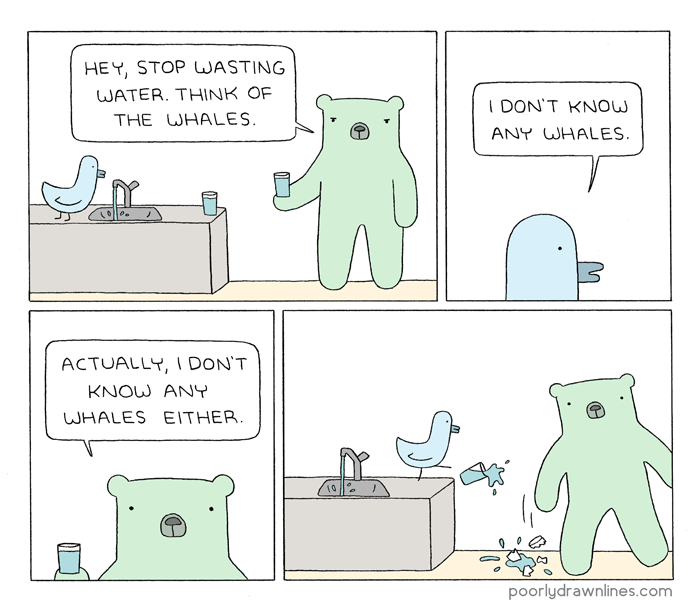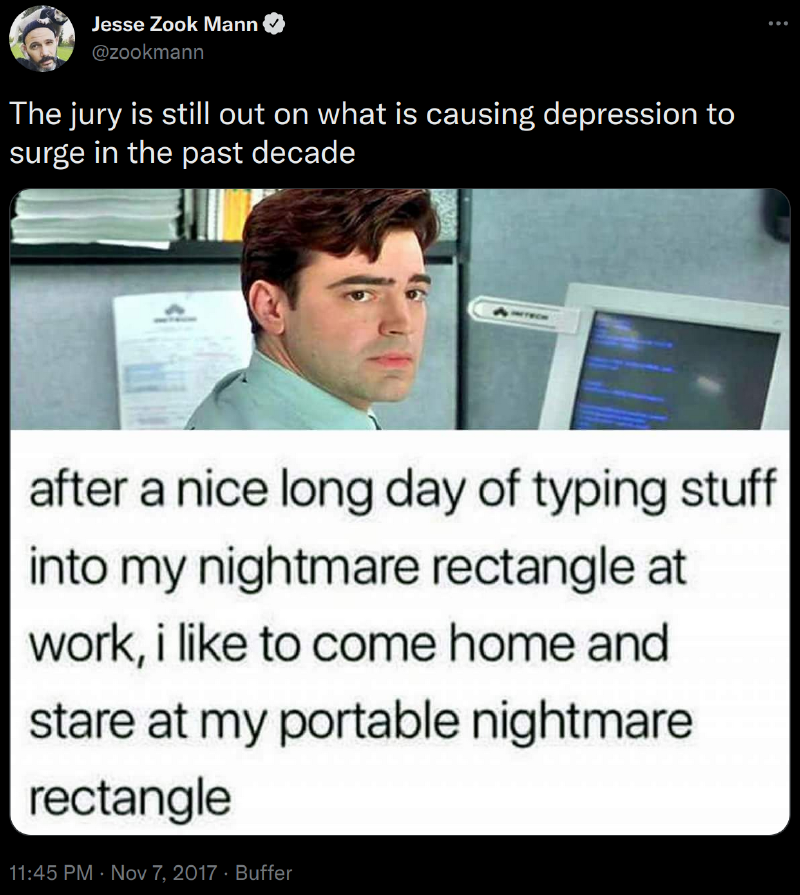So we are facing the most consequential fork in the road. If we continue as now, we are going to be irreparably going down a course of constant destruction, with much human pain and biodiversity loss. Or we can choose to go in the other direction, a path of reconstruction and regeneration, and at least diminish the negative impacts of climate change to something that is manageable.
But we can only choose it this decade. Our parents did not have this choice, because they didn’t have the capital, technologies and understanding. And for our children, it will be too late. So this is the decade and we are the generation.
Multiple factors contributed to my decision to leave Automattic last year. One factor was that the company’s mission to “democratize publishing and eCommerce” doesn’t resonate with me:1 First, publishing and eCommerce are already widely accessible. Second, despite decades of increased access to a wide variety of publication tools, global democracy is declining. Third, a corollary of the mission is hosting publications by the likes of News Corp Australia, an organisation that is harming Australian democracy according to former prime ministers from both sides of politics. Fourth, I believe that there are more pressing problems I can spend my time on.2
One such problem is the climate crisis. I was fortunate to have spent a small amount of time on it at Automattic, where I co-founded a sustainability employee group and led the company’s first purchases of carbon offsets and removals. However, this was a side gig.3
When I left Automattic, I was hoping to get involved more directly in climate and environmental action. Having recently joined Orkestra – a company whose mission is “to power the world’s energy decision-making” – I figured it’s time to share some thoughts on the climate tech space, along with resources that others may find useful.
Doing more with my climate obsession
I’ve always cared about the environment, but my levels of activity in the area have fluctuated over the years. While it’s no excuse, I suppose that environmental issues often appear too intractable, especially with the growth of human population and of the percentage of humans who live in societies that require continuous economic growth to prosper. Collectively, we still haven’t figured out how to obtain prosperity without growth. Given the magnitude of the problems, even the most influential individuals can only make a relatively small impact on driving solutions.
Still, being unable to do everything doesn’t mean one should do nothing, as the too-small-to-matter excuse can even be applied at the country level. For example, some people claim that given Australia’s small share of global emissions, it can’t play a significant role in addressing climate change. This conveniently neglects the fact that Australia has one of the highest per-capita carbon footprints in the world, and that it is a major exporter of fossil fuels. Clearly, Australia can do more to help achieve the collective goal of keeping global heating below truly dangerous levels. And doing it intelligently would help prosperity, as Australia is uniquely positioned to become a green energy superpower. Given the results of the last federal election, most Australians fall on the “do more” side of the debate.
Anyway, I am not a country, but similar logic applies: I can do more as an individual, even though my personal emissions are negligible when compared to the daunting amount emitted by humanity as a whole.
When it comes to climate action, a couple of key milestones for me were in 2015, when I became more aware of how I could divest from fossil fuels, and in early 2020, when the massive fires in Australia made me want to do something. Among other things, this led me to push for climate action within Automattic, as noted above. It also led me to – somewhat obsessively – consume quite a few resources on the topic. Honourable mentions go to Outrage + Optimism, Volts, TIL Climate, and My Climate Journey – many others are sprinkled throughout this article.
One outcome of the obsession is that I’m more aware of the impacts of climate change, environmental degradation, and government inaction. Massive fires? Climate change increases their frequency and severity. Global pandemics? Habitat loss and greater human-animal interaction increase their probability, while air pollution increases risk from respiratory infections. Widespread floods? Climate change increases flood impact and over-development on floodplains leads to avoidable suffering. More frequent coral bleaching? Increased emissions lead to ocean heatwaves and acidification, while reduced water quality and overfishing certainly don’t help ocean ecosystems.
So yeah, big problems. And one can always more/better to help. But it’s usually possible to also do less or worse. Therefore, I believe in doing more while cutting people slack, as suggested by Sami Grover:
So by all means, skip that next beef burger, or take a pass on that cheap flight to Cancún. But then ask yourself how you can magnify the impact of what you do. Are there campaigns or advocacy groups you can join? Can you talk to friends or family about the shifts you are making? Can you influence policy or practices at your place of work or study? Can you identify barriers to action that are preventing others from joining in?
In so doing, remember to cut yourself, and those around you, some slack. We are not each on an individual journey to slash our footprint to zero. We are on a collective mission to shift the only true footprint that matters: that of society as a whole.
Climate tech and its intersections with data science
When it comes to doing more, one path that a growing number of people seem to take is getting into climate tech. What is climate tech? Good question. To me, defining it is somewhat reminiscent of attempts to define data science, which I’ve tackled in posts from 2014 to 2018.4 In the same way that data science encompassed things that some people have been doing for decades, climate tech is giving a new name to existing activities. Broadly, I’d say that it’s work on technology to reverse, mitigate, and adapt to anthropogenic climate change.
Another parallel I see between data science and climate tech is that many things with tenuous connections to the field get lumped into it, in an attempt to capitalise on its trendiness. I think we’re past the peak of the data science hype, but there was a time when people who had only taken cursory looks at data rebranded as data scientists. Similarly, there are “climate tech” companies out there that may have a negative or neutral impact on fighting climate change. Personally, I’m also skeptical of grouping adaptation efforts under climate tech. For example, dealing with extreme weather events is needed even in a world with a stable climate, so I don’t think such work captures the intention behind climate tech (though it can be valuable).
Most importantly, no matter how you define climate tech and data science, there is a need for data skills to develop technologies that address climate change. And this is where data scientists who are concerned about the climate (like me) can help make difference. In the words of Saul Griffith:
If you are a tech worker, stop making social media and delivery apps and make software that helps people use less energy, balances the grid, automates the design of solar and wind plants, makes public transit work better, and does other useful things to accelerate our transition to renewables.
A structured approach to making career decisions
I’m fortunate to have skills that are in demand in the current market. I’m also fortunate to be in a financial position that allows me to take unpaid time off. Put together, this means that I have a high degree of freedom to choose how I spend my time.
In the past, I’ve advocated for asking why about every career step. And indeed, I can explain the reasoning behind every point in my resume. Sometimes, a step is due to dumb luck, e.g., I discovered that I was a data scientist in 2012, the year Harvard Business Review deemed it the sexiest job of the 21st century5 – I didn’t plan to become a data scientist when I started my PhD in 2009. And sometimes, a step is more planned – I specifically targeted Automattic as one of the few established fully-remote companies that was hiring data scientists in 2017, as my goals included living outside major cities and having a job that I can hold for more than a year without wanting to run away.
Given that my current position presents more options than I’ve had in the past, I decided to have a look through 80,000 Hours. I’ve been aware of their work for years, but my vague impression was that they’re overly utilitarian. However, digging through their resources, I found that they emphasise the importance of personal fit and well-being, both when it comes to career paths and to problem areas. For example, they aren’t too pushy about choosing the problems that they find most pressing if it doesn’t align with one’s beliefs and values.
The 80,000 Hours website contains a wealth of well-reasoned articles. I found the self-guided course on career planning useful to go through, as it helped me apply their main ideas to my situation. While I don’t feel like it led to a major shift in my views and plans, having more structure and a richer terminology to think through my career decisions is helpful.
That said, one area where I diverge from the 80,000 Hours philosophy is in concern about far-future human extinction. They conclude that climate change is less recommended than other problems as the odds of it leading to human extinction are low. However, working in the climate space should alleviate human suffering in this century and reduce the extinction risks of nonhuman animals. Both of these are important to me, especially given the rich cultural lives of animals like whales and dolphins.

Whales have cultures and massive brains, but perhaps you don’t care.
How I ended up with Orkestra
In retrospect, my ~4.5 years at Automattic could be divided into the pre-pandemic and pandemic periods. Pre-pandemic, I got to travel a few times a year to meet my colleagues in person. From the time the pandemic hit, this wasn’t an option. While I was lucky to be with a company that had already figured out how to work remotely, I found the complete lack of in-person interaction with my colleagues to be too isolating and monotonous.6 Together with the pandemic-era stressors that affected pretty much everything, I felt that Automattic had become a less pleasant place to work.
When reflecting on my decision to leave, I realised that I had experienced two of the three dimensions of occupational burnout: I was high on exhaustion and cynicism, but felt like I still had professional efficacy. As I take pride in doing good work, I was concerned about losing my sense of efficacy and burning out on all three fronts. It was definitely time to leave, especially since burnout is seen by researchers as “a sign of a major dysfunction within an organization [that] says more about the workplace than it does about the employees”.
Given my recent burnout experience, I was reluctant to jump into a full-time job. I took some time to relax, and worked on side projects like getting my website off WordPress.com and developing a web app for fish identification. Concurrently, I was also looking to learn more about the climate tech space. I was already a member of the Climate Action Tech community and a consumer of various other climate-related resources, but my search had also led me to places like the Climate People agency and the Work on Climate community. Looking through these resources became a part of my routine, and it was on the Climate Action Tech Slack that I saw a short message by Chris Cooper, advertising open positions at Orkestra (then called Vippy).
From the time I decided to enquire, things moved quickly. By early February, we agreed to engage in a short-term contract where I would do data science work for three days per week. This was largely because I wanted to keep my options open and avoid over-committing myself, especially after the burnout I experienced at Automattic.
While the original plan was to use the contract as a trial towards full-time employment, I found that I enjoyed working only three focused days on Orkestra. It was a refreshing change from the sort of work I was doing at Automattic – perhaps a similar feeling to that of a former Automattic employee who moved to DuckDuckGo: “the big shift was to an all-business-low-drama environment, meaning that my job was cognitively harder but emotionally easier”.
Therefore, while Orkestra would have preferred for me to come on board as a full-timer, we recently agreed that I join as a 70%-time employee, which on most weeks means three long workdays. I think it’s a win-win, as human productivity isn’t a linear function of time spent working – with 70% I’m likely to produce more than I would in the same amount of time as a full-timer. And I have plenty of time off work, which reduces risk factors associated with excessive time dealing with rectangles.
In general, I see this sort of flexibility as the future of work in many professions. The forty-hour workweek isn’t sacred – Keynes predicted its demise almost a hundred years ago. With remote and hybrid work becoming the norm in jobs that don’t require in-person presence, employers calling themselves flexible should go beyond remote options.
A question I get a lot is what I do in my days off work. I guess it’s pretty much the same stuff people do on shorter weekends, but with more time to spare. For example, one area that I’ve had more time to invest in is my involvement with the Reef Life Survey Foundation – I’m helping on several trips and with some technical work. In general, if the Orkestra arrangement sticks in the long term, it should also give me time for open source contributions and skill development. As I noted previously, there’s just so much interesting stuff happening in data science that no single job can cover it all – the FOMO is real! With extra time in the week, I can fight the FOMO more effectively, while still having enough off-rectangle time.
Finally, what about the work I do with Orkestra? I can’t share much yet, but I can say that I’m learning a lot about the energy space. I hope to post more about it in the future, so please stay tuned.

Rectangles are useful, but we also need time without them.
In addition to the mission, Automattic CEO Matt Mullenweg has shared his vision of making Automattic the Berkshire Hathaway of the internet, a goal that I find even less inspiring. ↩︎
While I was aware of the mission when I joined Automattic in 2017, it wasn’t a critical criterion for me. Over the years, I’ve become more conscious of the role online platforms play in destabilising societies. I now believe that it’s important for platforms to acknowledge their responsibilities and delegate power to external regulators, e.g., as Facebook is doing with their Oversight Board (which is still an imperfect solution). ↩︎
It’s also an open question whether it’s possible to offset things like the harmful work of the Murdoch press. ↩︎
I still like the 2018 definition, so hopefully I’m done with defining data science. ↩︎
According to a recent study, data science is seen as an incredibly boring job. Not sexy at all. ↩︎
Despite this, I wasn’t particularly looking forward to going back to frequent long-haul flights – it was an aspect of Automattic work I never liked. This made the prospect of post-pandemic work with Automattic less appealing, even without considering the climate impact of so much flying. ↩︎

Public comments are closed, but I love hearing from readers. Feel free to contact me with your thoughts.
Jessie Ross
2022-06-06 07:55:44
Yanir Seroussi
2022-06-06 21:26:58